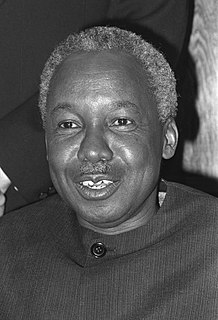A Quote by Meles Zenawi
We have our own script. We have our own calendar. We represent the greatness of Africa's past. We also represent the worst of Africa's present, in terms of poverty. It is the best and the worst of African reality.
Related Quotes
We've separated from mogul and aerial skiing and we've built our own sport and our own tricks. And now we're going back to the roots. But the Olympics is a world stage for athletics and it's going to be pretty sweet to represent our sport and represent our culture and show everyone what we're all about.
I finally understood: In order to contribute to Africa, I would have to know myself better and be clearer about my goals. I would have to be ready to take Africa on its own terms, not mine, and to learn my limits and present myself not as a do-gooder with a big heart, but as someone with something to give and gain by being there. Compassion wasn't enough
I started as an engineer. I migrated to philosophy and international politics. And I did my studies about African - Africa democracy and democratization in Africa, taking Kenya as a model. And then, while I was doing so in 1996 in South Africa, Al Jazeera was established. So they requested me to be an analyst on African affairs.
Unity will not make us rich, but it can make it difficult for Africa and the African peoples to be disregarded and humiliated. And it will, therefore, increase the effectiveness of the decisions we make and try to implement for our development. My generation led Africa to political freedom. The current generation of leaders and peoples of Africa must pick up the flickering torch of African freedom, refuel it with their enthusiasm and determination, and carry it forward.
We deal with our mind from morning until evening. This mind can be our best friend or our worst enemy. We should do everything we can to improve outer circumstances - remedying poverty, inequalities, conflicts, and so on - while also doing our best to achieve a state of mind that give us the inner resources to deal with the ups and downs of life.
I spent my youth and my most formative years in Africa. I left Africa when I was about 20, 21, and when Mo says a great African, I was really moulded by my African experience, although I had the good fortune that by the time I was 24 I had studied and worked on three continents - Africa, the US, and Europe.









































